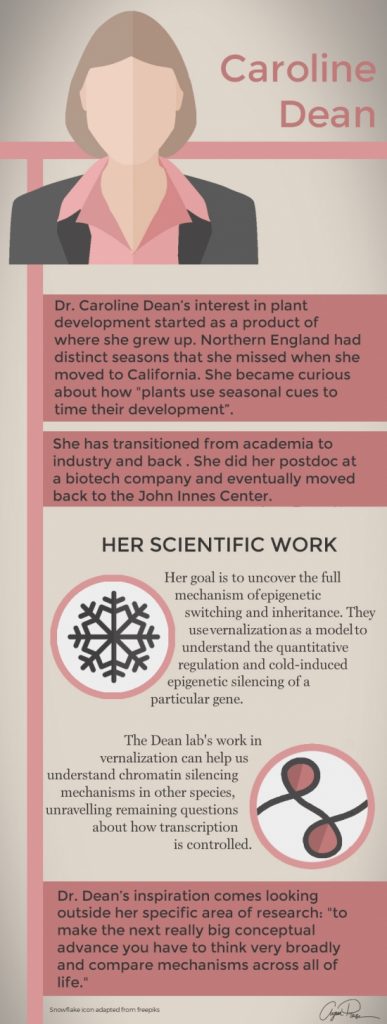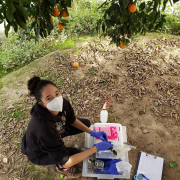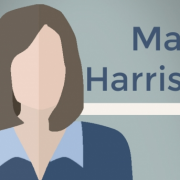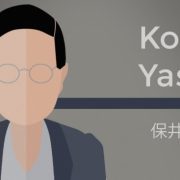Plant Scientist Highlight: Caroline Dean
A series by Alyssa Preiser
 Why did you decide to pursue science as you went through college, and what got you particularly interested in epigenetics and plant developmental transitions?
Why did you decide to pursue science as you went through college, and what got you particularly interested in epigenetics and plant developmental transitions?
I loved the documentaries of the marine biologist Jacques Cousteau so I chose to study marine biology at university. There I discovered biochemistry, which I hadn’t really done at school. There was a particular plant biochemistry practical that I really enjoyed, where we isolated chloroplasts and did electron transport analysis. It really hooked me on lab work.
My interest in plant developmental transitions stemmed from my enjoyment of the distinct seasons in the north of England, where I grew up. When I went as a postdoc to California, I missed the clear seasonal transitions. When I bought some tulip bulbs the shop-owner advised me to “Put them in the fridge for 6 weeks.” I was so struck by the comment that I went and read about why I would put them in the fridge, and realized that tulips actually need the cold to bloom. That got me thinking generally about how plants use seasonal cues to time their development. Around this time, the Arabidopsis phenomenon was happening -plant geneticists had discovered the utility of focusing on one species as a model organism, and we could now clone genes important for complex traits through map-based cloning. So when I started my own lab, I chose to tackle the molecular basis of vernalization in Arabidopsis.
What values did you learn growing up that you carry into your work today?
I was the oldest of 4 with two younger brothers – and my mother was the bread winner of the family from when I was 10. That upbringing clearly influenced my values with respect to taking responsibility and sticking up for oneself.
What are some examples of some unexpected hurdles you’ve encountered in your career and/or lab work and how did you overcome them?
There are of course lots of hurdles as you proceed in a career – but I have not experienced any major clearly identifiable ones. There were many times I had to take a deep breath and plough through- but those experiences helped me ‘grow’ and certainly increased my confidence.
What do you hope to be remembered for in 100 years (work from your lab, other projects you participate in, etc.)?
For uncovering the full mechanism of epigenetic switching and inheritance – I think gene regulation in eukaryotes comes down to controlling transcriptional output through switching between opposing chromatin states. I hope the system we are studying – vernalization – the quantitative regulation and cold-induced epigenetic silencing of the FLC gene, will provide broad understanding of these chromatin switching mechanisms.
Starting new projects, challenging current thinking and paradigms, pioneering new techniques takes a lot of creativity. Where do you find inspiration to tackle these new challenges?
This is a really interesting question! I think too many scientists only expose themselves to science that is very related to what they are already doing. To make the next really big conceptual advance you have to think very broadly and compare mechanisms across all of life.
You’ve gone back and forth between academia and industry- Why did you go into biotech and what brought back you to academia? Did you take any lessons with you from industry, and if so, what are they?
I did my postdoc in a start-up biotech company, Advanced Genetic Sciences, in Oakland, California. The prospect of creating genetically modifying plants had attracted venture capital funding. The director, John Bedbrook (who came from academia), established an academic-style lab with the goal of becoming experts in how to modify plants genetically and express foreign genes. I learned all my molecular biology there. They were very exciting times, because the science was moving very quickly and I was completely converted to a ‘can-do’ attitude. However, after five years the projects became very product oriented, so in 1988, I moved back to the UK, to the John Innes Centre.
Do you have a memorable quote that has stuck with you?
As a young and not very experienced post-doc, my advisor John Bedbrook encouraged me never to be intimidated by scientific competition. His memorable quote was “ We will do it better”.
What is one piece of advice for early-career scientists that you would like to pass on?
The piece of advice I give to many early-career scientists is to identify an exciting, long-term scientific question – then make an ambitious experimental plan and go for it. I see too many early-career scientists overthinking things and arguing themselves out of projects because they sound too ambitious.
Download the graphic CDean









